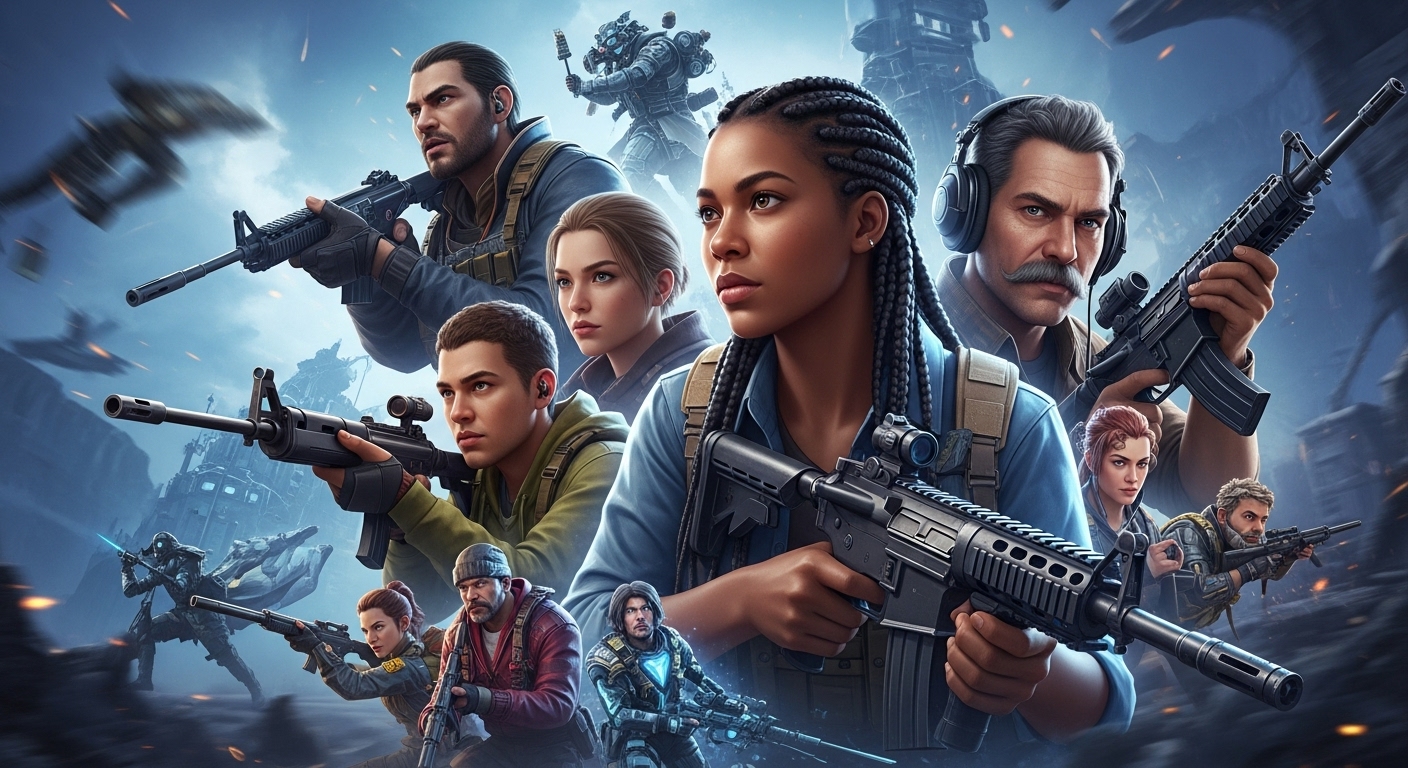FPS, or first-person shooter, is a genre that’s captivated gamers for years, pulling them into virtual worlds where they take on the role of the protagonist, seeing everything from their perspective. It’s a gameplay style that’s engaging, adrenaline-pumping, and sometimes just plain chaotic. But let’s talk more about what makes FPS games so gripping, how they’ve evolved, and why they’ve got such a tight grip on the gaming community.
The Evolution of FPS Games
From blocky graphics to hyper-realistic visuals, FPS games have come a long way since their inception. Remember back in the day when first-person shooters were just starting to gain traction? Games like “Wolfenstein 3D” and “Doom” were pioneers, setting the groundwork for what was to come. They were simple, sure, but they brought something new to the table—immersion.
Old School vs. New School
The old school FPS games were straightforward: pick up a gun, find the enemy, shoot. No complex narratives or character arcs. Fast forward to today, and you’ve got games that are borderline cinematic experiences with intricate storytelling, moral choices, and character development. Think “Half-Life” or “BioShock”—games that not only challenge your reflexes but also engage your mind.
The Tech Leap
Technology has played a huge role in the evolution of FPS games. The leap from 2D sprites to 3D environments was monumental. Then came the advancement in physics engines, AI behavior, and graphic rendering. Now, with VR, the line between reality and games is blurrier than ever. Imagine stepping into a game world where you physically move and interact. It’s almost like living another life.
What Makes FPS Games So Addictive?
So why do people keep coming back for more? It’s not just about shooting things (though, let’s be honest, that’s a big part of it). It’s the feeling of being the hero in your own blockbuster video game. It’s the adrenaline rush you get from surviving a firefight or executing the perfect strategy with your team.
Competitive Edge
Competitive gameplay is a massive draw. Games like “Call of Duty” and “Counter-Strike” have thriving esports scenes, where players from around the world compete for glory (and some hefty prize money). Whether you’re climbing the ranks in matchmaking or just playing with friends, the competitive nature of these games hooks players.
Community and Collaboration
FPS games often foster strong communities. You’ve got forums, fan sites, and social media groups where players share strategies, create fan art, or just chat about their favorite game moments. Not to mention the in-game experiences where teamwork is essential. Games like “Rainbow Six Siege” or certain modes in “Overwatch” require players to work together, creating bonds and fostering friendships.
A Feast for the Senses
The graphics, the sounds, the music—all contribute to an immersive experience. The detail in modern FPS games is staggering. Developers create expansive worlds with intricate details that make them feel alive. You’re not just playing a game; you’re stepping into a different reality.
The Impact of FPS Games on Culture
FPS games aren’t just entertainment; they’ve become a cultural phenomenon. They influence movies, TV shows, and even music. Thematically, they explore everything from dystopian futures to alternate histories, providing a lens through which we can examine our own world.
Controversies and Criticisms
Of course, it’s not all sunshine and rainbows. FPS games often face criticism, particularly regarding violence. Some argue they desensitize players or even encourage aggressive behavior. It’s a debate that’s been going on for years, with opinions heavily divided. Yet, a BBC article highlights how the relationship between video games and violence isn’t as clear-cut as some might think.
Breaking Stereotypes
Yet, there are many ways FPS games are breaking stereotypes. The diversity of characters and stories is growing. Games are becoming more inclusive, featuring protagonists from different backgrounds and addressing various social issues. It’s a step forward, showing that the genre can be more than just guns and explosions.
Diversity in FPS Games
Speaking of diversity, it’s fascinating how FPS games have embraced it over the years. Initially, most were centered around male protagonists and military themes. But that’s changing—slowly but surely.
Women and Minorities
More games now feature women and minorities as central characters, reflecting a broader range of experiences. “Overwatch”, for instance, boasts a roster of characters from all around the globe, each with unique backgrounds and stories. It’s not just about representation; it’s about authenticity and relatability.
Storytelling and Themes
The narratives in FPS games are also evolving. They’re not just about warfare or alien invasions anymore. Games like “Spec Ops: The Line” delve into the psychological impacts of conflict, making players question morality and the cost of their actions. These stories provide depth and make the gaming experience more profound.
Future of FPS Games
Looking ahead, what’s next for FPS games? It seems the possibilities are endless. With technology constantly evolving, the line between games and reality will continue to blur.
Virtual and Augmented Reality
VR and AR stand at the forefront of this evolution. Imagine playing an FPS where your living room becomes the battlefield. The potential for new gameplay mechanics and immersive experiences is immense. And it’s not just about entertainment; these technologies could be used for training, education, and even therapy.
AI and Machine Learning
AI is another area with massive potential. Smarter AI could lead to more challenging and dynamic enemies. Also, procedural generation, where games create content on the fly, could lead to unique experiences for every player. It’s an exciting time to be a gamer.
FAQs
- Why do FPS games have such a strong appeal? They offer intense action, competitive play, and immersive worlds. Plus, you get to be the hero in high-stakes scenarios.
- Are FPS games too violent? It’s a mixed bag. Some say they desensitize players, while others argue it’s all about context and personal responsibility.
- How realistic are modern FPS games? With advances in technology, they’re more realistic than ever. But they still balance realism with fun.
- Can FPS games be educational? Absolutely. They can promote strategic thinking, teamwork, and even historical knowledge, depending on the game.
- Will VR change FPS games significantly? Probably. It’s a game-changer, offering new ways to interact and engage with the virtual world.
FPS games have woven themselves into the fabric of gaming culture. They’re more than just a genre—they’re a movement. Whether you’re a casual player or a hardcore fanatic, there’s something in FPS for everyone. So, what’s your favorite FPS game, and why do you love it? That’s a conversation worth having.


